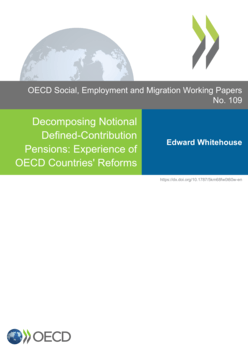Hello! You're looking at a policy document report on Overton
We track government policy, guidelines, think tank research, working papers and more to help our customers see the impact and influence of their work. Are you interested in seeing what information we have to offer? Request a free trial to our platform.
If you fund, produce or manage research or work to influence policy, we'd love to talk. Learn more on our homepage.

Identifiers
Decomposing Notional Defined-Contribution Pensions
Decomposing Notional Defined-Contribution Pensions
Edward Whitehouse
This paper compares notional defined-contribution pension schemes (also known as notional accounts) with two alternative designs of earnings-related pension schemes: points systems and definedbenefit plans. It examines, in detail, four economic advantages of notional accounts that deliver retirement incomes in an equitable and economically efficient manner. The issue of equity arises in the treatment of people who draw their pensions at different ages and contribute for a different number of years. The issue of economic efficiency arises because pension systems can and do distort individual decisions to work and save. First, benefits are based on lifetime earnings, rather than a subset of “best” or “final” years’ pay. Secondly, an extra year’s contribution gives rise to an additional benefit. Thirdly, benefits are reduced to reflect the longer expected duration of payment for people who retire early and, similarly, increased for people who retire late. Finally, benefits are reduced as life expe...
Topics in this document
Welfare
Defined benefit pension plan
Life annuity
Annuity (European)
Finance
Economy
Financial services
Demographic economics
Old age
Pension
Defined contribution plan
Retirement
Life expectancy
Personal finance
Termination of employment
Family economics
Risk
Private pension
Economics
Employee relations
Factor income distribution
Citations
Cited by 73
other policy documents
(13 of them are from other policy sources)
